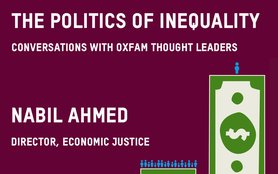With massive spending packages on the table, Congress must ensure that these funds benefit workers, marginalized communities, women, and the environment—and not further entrench inequality.
As early as next week, Congress will vote on the parameters for a massive investment in our nation’s future. A bipartisan group of senators, with President Biden’s endorsement, has proposed $1.2 trillion in federal infrastructure spending. Senate leaders just announced a $3.5 trillion spending plan that encompasses care work, climate resilience, and early childhood education, while progressive Democrats have called for an even bigger $6 trillion package.
The federal government won’t spend all this money directly; a huge amount will head to corporations that are run for private profit, not necessarily the public good. And that’s when we need to keep our eye on the ball: will companies enrich their wealthy shareholders and executives and carry on with business as usual? Or can we effectively impose and enforce rigorous standards about how our money is spent?
Put simply: Will this new public spending go to advance climate, gender, racial, and worker justice? Or will it just juice investor returns and hike CEO bonuses?
Putting in place proper transparency, oversight, and accountability for public funds flowing to private corporations is just a start: we must be able to track every dollar and how it is spent. But simply preventing corporate corruption is not sufficient to meet the interconnected crises we face.
We have one chance to get this right. A 13-figure investment from Congress should not be a blank check to giant corporations.
Any new congressional spending needs to:
- uphold the rights and dignity of workers,
- prevent corporate profiteering,
- be fully transparent
- advance gender justice and racial equity, and
- directly address the climate crisis.
Agenda for investing in a progressive recovery
1. Any new jobs created with these funds must be good for the workers and their families. They should:
- pay a living wage,
- include robust health and safety protections,
- offer paid sick and family leave, and
- ensure workers’ rights to bargain collectively if they wish to do so.
2. Do not allow corporations to reward management and shareholders.
- No stock buybacks.
- No exorbitant CEO pay packages with public dollars.
- No layoffs or outsourcing to inflate corporate profits at the expense of workers.
3. Public money requires transparency and accountability. No business in the dark; companies should:
- publish basic financial information about every country where they operate,
- close down shady operations in tax havens,
- be fully transparent about lobbying—including lobbying done by trade groups—and be open about positions taken behind closed doors, and
- publish information about their emissions footprint, including methane, and detail their efforts to mitigate their impact on the climate crisis.
4. All funds should promote gender justice and racial equity. Congress should:
- ensure that funding flows to women- and minority-owned businesses,
- require protections for pregnant and nursing mothers,
- provide health care that covers specific gender- and sex-related medical needs,
- require information about gender and race pay gaps—and plans to close them, and
- push for diversity in corporate directors and senior executives.
5. Address the climate crisis. We must invest in climate solutions that support just and inclusive economies. Congress should:
- require big corporate polluters to aggressively reduce emissions to avoid increasing climate disasters and build climate resilience to keep communities safe,
- divest from dirty pollution: public funding should not be used to continue to subsidize and prop up the fossil fuel industry or industrial-scale agriculture/livestock emissions,
- invest in justly sourced, sustainable solutions: funding flows must prioritize investments in communities hardest hit by systemic pollution and the impacts of climate change, and
- upgrade infrastructure with just investments in clean air, water, energy, and public transportation.
Why are we so alarmist about this? Because we just sat by as federal funds got wildly misspent after the CARES Act in 2020. Not only through fraud and abuse, but through countless missed opportunities, as funds were disproportionately denied to Black business owners, and spent on egregiously inappropriate ventures.
Fortunately, the red-hot emergency phase of the pandemic seems to be over. The economy is reopening, and vaccinations are helping slow the spread of the virus. We have time to do this right. To put strings on money that tie investments to progressive change that benefits those who need it most, rebuilds to strengthen our infrastructure and our future, and tackles climate change.
Act now to tell Congress we need to prioritize long-term investments in our country’s future, not short-term corporate profits.



